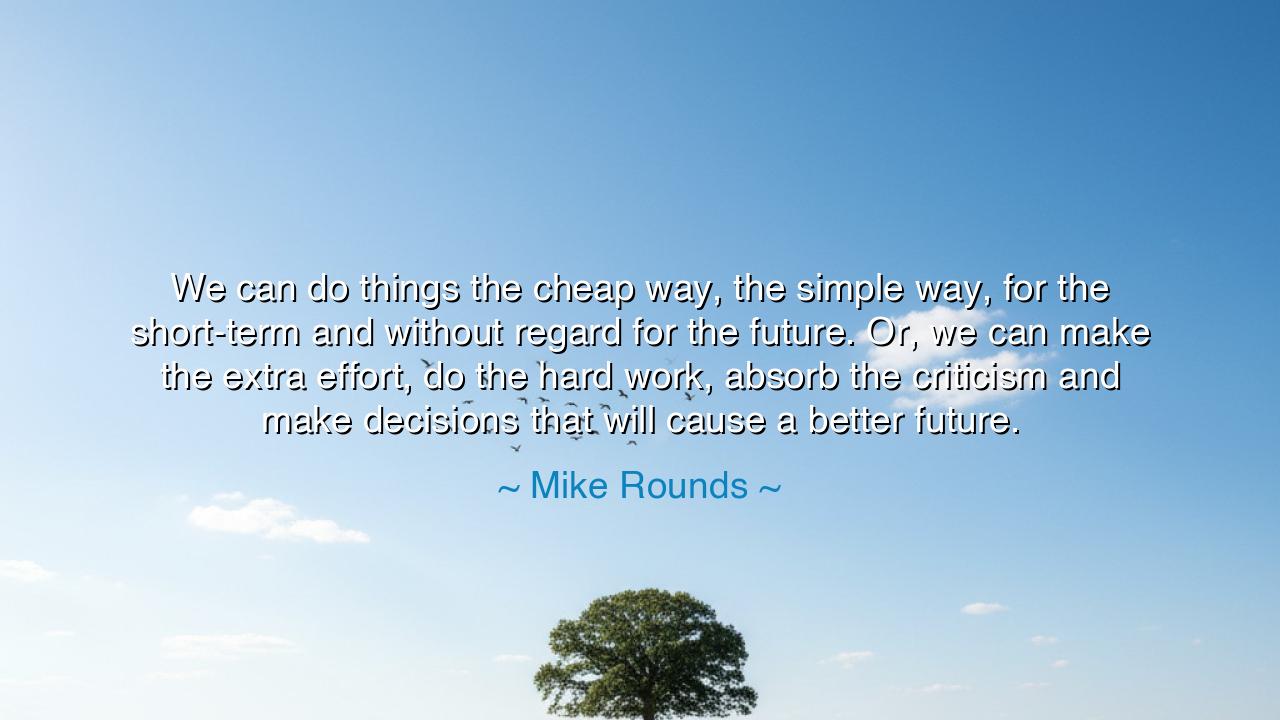
We can do things the cheap way, the simple way, for the
We can do things the cheap way, the simple way, for the short-term and without regard for the future. Or, we can make the extra effort, do the hard work, absorb the criticism and make decisions that will cause a better future.






“We can do things the cheap way, the simple way, for the short-term and without regard for the future. Or, we can make the extra effort, do the hard work, absorb the criticism and make decisions that will cause a better future.” Thus spoke Mike Rounds, a statesman of foresight, whose words reach beyond politics into the very heart of human endeavor. In these lines, we find not merely advice for governance, but a timeless truth about the soul’s labor—the eternal struggle between the easy path of comfort and the noble road of endurance. His words echo through every age, calling upon those who build, lead, and dream to think not of the moment, but of legacy.
The origin of this quote lies in Rounds’s work as a public servant, where choices were never made in the quiet of isolation but in the roaring storm of opinion. As a leader, he understood that to do what is right often means to do what is hard. He saw how nations, like individuals, are forever tempted by the seduction of short-term gain—by the illusion that one may reap the harvest without tending the soil. Against this temptation, he sets his creed: to make the extra effort, to endure the criticism, and to choose the future over the fleeting. His wisdom belongs not only to rulers, but to every person who dares to build something that will outlive them.
There has always been this division in the world—the builders and the quick gainers, the sowers and the harvest thieves. To do things the cheap way is to live for applause today and despair tomorrow. It is to patch a leaking roof instead of rebuilding the house. It is to chase comfort and neglect duty. The ancients would have called this the way of decay, the path that seems easy but leads only to ruin. For nothing of worth has ever been born without struggle, and nothing enduring has ever been built without sacrifice. The pyramids, the cathedrals, the republics of freedom—all were forged by hands that labored beyond their own lifetimes.
Consider the story of President Abraham Lincoln, who faced a divided nation and could have chosen compromise for peace. Yet he chose the harder road—the road of unity through justice, though it cost him war, grief, and the weight of unending criticism. He was mocked, misunderstood, reviled by friend and foe alike. But he saw further than his own age. He chose to suffer for the sake of the future, to ensure that liberty might live when his body was gone. His choice was not the easy one, but the right one, and his legacy still lights the way for those who lead with conscience rather than comfort.
So too, in our own lives, we stand each day before this same fork in the road. We may do what is simple, pleasing, and safe—or we may do what is difficult, meaningful, and true. To work well, even when unseen; to speak truth, even when unwelcome; to persist, even when weary—these are the acts that shape a better tomorrow. Every great work, whether the raising of a family, the building of a company, or the stewardship of a nation, demands the courage to absorb criticism and continue onward. The coward seeks ease; the wise seek endurance.
Mike Rounds’s words remind us that the future is always watching. Every decision made in haste, every shortcut taken for convenience, casts a shadow upon generations yet unborn. But likewise, every act of patience, every moment of integrity, every sacrifice for the good—these plant seeds that bloom long after we are gone. To live with such awareness is to live with honor. It is to take one’s place among those who build not for reward, but for righteousness.
Therefore, my listener, let this be your teaching: do not seek the easy way. Let your work be marked by care, your choices by wisdom, and your purpose by love of the generations to come. When the world urges you toward haste and simplicity, remember that the quick road leads only to shallow destinations. Walk instead the path of steady labor, the one paved by diligence and courage. Build what will last.
For in the end, the world remembers not those who lived for themselves, but those who bore the weight of tomorrow upon their shoulders. As Mike Rounds teaches, make the extra effort—not because it is easy, but because it is good. The stones you lay today will become the foundation of the future. And when that future stands tall, bathed in light, it will whisper your name in gratitude, for you chose not the easy way, but the enduring way—the way that builds a better world.






AAdministratorAdministrator
Welcome, honored guests. Please leave a comment, we will respond soon